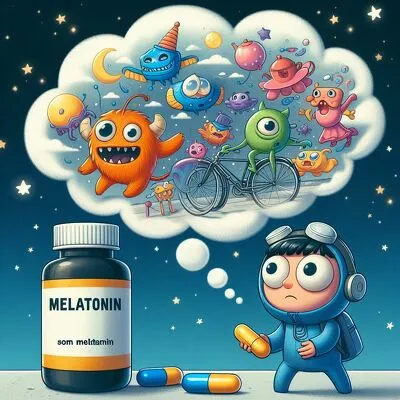The Dark Side of Sweet Dreams: Unveiling Why Melatonin Might Lead to Nightmares

Melatonin, often hailed as a natural sleep aid, has a darker side that intrigues and concerns many. While it effectively regulates sleep cycles, some users report experiencing vivid and unsettling nightmares. This phenomenon raises questions about the intricate relationship between melatonin supplementation and dream intensity. Understanding why melatonin can cause nightmares involves delving into its effects on the brain’s sleep architecture and the mechanisms governing dreams.
I. Introduction to Melatonin and Sleep
A. Overview of Melatonin’s Role in Sleep Regulation
Melatonin, a hormone naturally produced in the pineal gland, plays a crucial role in managing our circadian rhythms, essentially serving as the body’s clock. Its production increases with the onset of darkness, signaling the body it’s time to prepare for sleep. This hormone’s importance in sleep regulation has made it a popular supplement for those struggling with sleep disorders, jet lag, or irregular sleep patterns.
B. The Phenomenon of Nightmares
Nightmares are distressing dreams that often result in awakening and can significantly impact sleep quality. They are a common experience affecting both adults and children and can be influenced by various factors, including stress, trauma, and, as some studies suggest, the use of certain supplements like melatonin.
C. Linking Melatonin to Vivid Dreams and Nightmares
An intriguing aspect of melatonin use is its association with increased dream vividness and the potential to induce nightmares. This link raises questions about how melatonin affects dream content and intensity, leading to a deeper investigation into its impact on the sleep cycle and dream phases.
II. The Science Behind Melatonin and Dreams
A. Melatonin’s Impact on REM Sleep
Rapid Eye Movement (REM) sleep, the phase most associated with vivid dreams and nightmares, appears to be influenced by melatonin. Melatonin has been observed to potentially extend REM sleep duration, which might intensify dream experiences and increase the likelihood of nightmares.
B. Neurochemical Changes Induced by Melatonin
Melatonin interacts with various neurotransmitter systems within the brain, affecting the regulation of sleep and mood. Its impact on these systems might explain the changes in dream patterns and the emotional intensity of dreams experienced during supplementation.
C. Studies and Research Findings
Research on melatonin’s effects on sleep and dreams provides mixed outcomes. Some studies indicate an increase in dream vividness and nightmare frequency with melatonin use, while others find no significant change. This variability suggests a complex interaction between melatonin, sleep architecture, and individual predispositions.
III. Factors Contributing to Melatonin-Induced Nightmares
A. Dosage Variability and its Effects
The dosage of melatonin taken can significantly affect its impact on sleep and dreams. Higher doses are more likely to alter sleep patterns and increase the chances of experiencing vivid dreams or nightmares.
B. Individual Biological Differences
People metabolize melatonin differently, influenced by genetic factors, age, and overall health. These differences can affect how individuals respond to melatonin supplementation, including the intensity of their dreams.
C. Interaction with Medications and Substances
The combination of melatonin with certain medications or substances, such as antidepressants or alcohol, can alter its effects, potentially leading to an increased risk of nightmares or disturbing dreams.
IV. Managing and Mitigating the Risk of Nightmares
A. Recommended Melatonin Dosages
To minimize the risk of nightmares, it’s crucial to adhere to recommended dosages of melatonin, typically ranging from 0.5 to 5 mg for adults. Starting with the lowest effective dose can help manage sleep issues without adverse effects on dream content.
B. Lifestyle and Sleep Hygiene Practices
Incorporating good sleep hygiene practices, such as maintaining a regular sleep schedule, creating a comfortable sleep environment, and avoiding stimulants before bedtime, can enhance the effectiveness of melatonin and reduce the likelihood of nightmares.
C. Alternative Solutions for Sleep Disorders
For those who experience adverse effects from melatonin, exploring alternative therapies, such as cognitive-behavioral therapy for insomnia (CBT-I), may provide relief without impacting dream content.
V. FAQs
Q: Can melatonin cause nightmares?
A: Yes, some individuals report an increase in vivid dreams and nightmares when taking melatonin supplements.
Q: What is the recommended dosage of melatonin to avoid nightmares?
A: It’s generally recommended to start with a low dose, such as 0.5 mg, and gradually increase, if necessary, not exceeding 5 mg for most adults.
Q: Does melatonin affect all stages of sleep?
A: Melatonin primarily influences the onset of sleep and can affect the duration of REM sleep, where most vivid dreams occur.
Q: Are there any groups of people who should avoid taking melatonin?
A: Pregnant or breastfeeding women and individuals with certain medical conditions or taking specific medications should consult a healthcare provider before using melatonin.
Q: Can improving sleep hygiene reduce the risk of melatonin-induced nightmares?
A: Yes, good sleep practices can enhance sleep quality and may help mitigate the risk of vivid dreams and nightmares when taking melatonin.
Q: Are there alternatives to melatonin for managing sleep disorders?
A: Alternative treatments, such as cognitive-behavioral therapy for insomnia (CBT-I), have been effective for some people without the side effects associated with supplements.
Q: Is it safe to take melatonin every night?
A: While melatonin is considered safe for short-term use, long-term safety data is limited, and it’s best to use it under the guidance of a healthcare provider.
VI. Conclusion
A. Balancing the Benefits and Drawbacks of Melatonin
While melatonin is an effective aid for many people struggling with sleep issues, its potential to induce vivid dreams and nightmares cannot be overlooked. Users must weigh the benefits of improved sleep against the possibility of disruptive dream experiences.
B. The Importance of Personalized Sleep Solutions
Given the variability in individual responses to melatonin, personalizing sleep management strategies is crucial. This may involve adjusting dosages, improving sleep hygiene, or exploring alternative treatments.
C. Future Research Directions
Further research is needed to understand melatonin’s impact on dreams and nightmares fully. Studies focusing on long-term use, interactions with other substances, and genetic predispositions could provide valuable insights into minimizing adverse effects while maximizing sleep quality.
VII. Suggested Readings
Expanding your knowledge through related readings can provide a broader perspective before delving into the complexities of melatonin and its effects on sleep.
- “Why We Sleep: Unlocking the Power of Sleep and Dreams” by Matthew Walker – A comprehensive exploration of sleep’s vital role in our health and well-being.
- “The Sleep Solution: Why Your Sleep is Broken and How to Fix It” by W. Chris Winter – Practical advice on overcoming sleep challenges, including insights into supplements like melatonin.
- “Dreamland: Adventures in the Strange Science of Sleep” by David K. Randall – An engaging journey into the science of sleep, offering fascinating insights into how our brains work at night.
After exploring these readings, you’ll be better equipped to understand the nuances of sleep, the role of melatonin, and how to achieve a balanced and refreshing night’s rest.






